|
|
Chapter Nine: The One That You Love (1981)
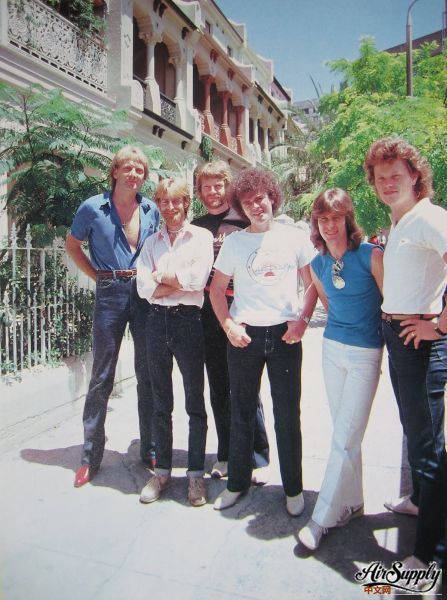
David Green (Third from left)
Air Supply spent the first few months of 1981 at home in Australia. The previous year was a whirlwind of recording, touring, and promotional activity. The band looked forward to recording the next album in Sydney because it meant they could spend time with family and friends. Russell was just a year into his marriage and the travel and time spent away in America was challenging. “I missed Di’s cooking, Vegemite on crumpets, the Bridge, the Opera House, the Hoyts Entertainment Complex and sleeping in my own bed,” he said. “It sounds dumb, but yesterday I did the washing-up and it was great.”
The forthcoming album was recorded with producer Harry Maslin at Paradise Studios. Maslin was not a staff producer at Arista, but he was the producer Clive Davis called upon most when he needed a hit single. “I got called in from the bullpen a lot with Clive,” said Maslin. “He would call and say, ‘I’ve got this album and I don’t have a single on it, can you see what you can do.’ Clive called [in 1980] and said he needed another sure-fire hit for Air Supply. He played me ‘Every Woman In The World,’ a real lightweight song, but at the same time a real catchy, hooky MOR tune. That led to me doing the whole second album. I was real nervous about this. These guys just had three hit singles off one album. I figured that if nothing happens, there goes my career. With Air Supply, obviously I had to maintain what they had going for them already; the vocals and the fact that they’re excellent doing big ballads. The main thing I wanted to change was to make them sound more like a band and not just a bunch of studio musicians. I think we succeeded at that.”
Clive Davis worked closely with Maslin and Air Supply in the studio. He knew the ingredients to Air Supply’s success, and his hands-on approach ensured that each album met his approval. Davis and Maslin worked well together because they shared an appreciation for commercial music. “Obviously, Clive has some gift for picking songs and getting the songs out there,” said Maslin. “If he wanted to go in one direction and it was not against my grain, I’d see what we could do. From what I had done with other labels, it seems a lot of presidents couldn’t care less on a creative level. I think it’s crazy to shut off that input. This is the guy who’s going to be out there selling your record. If it were some first-level A&R guy that’s one thing, but you’re dealing with the president of the company. I probably lean toward the side that says, the music business is a business. You can be as artsy as you want and not sell any records. As a producer, you should know the business and what the public wants to buy.”
“When we first met Clive,” said Graham, “we knew that he was responsible for some great artists like Simon and Garfunkel, Janis Joplin, Bob Dylan and a host of others. But it wasn’t until we went to his office in New York where we saw all these iconic pictures on the wall of Clive with all the greatest musicians and songwriters that there ever were. We were like, ‘Oh my God, this guy is the guy in the music industry.’ Fortunately, he took a liking to us and he heard something and saw something when he met us.”
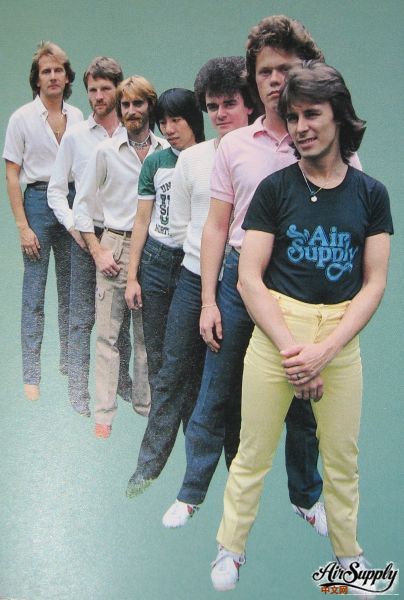
The Air Supply band now consisted of Ralph Cooper on drums, Davide Moyse and Rex Goh on guitar, David Green on bass, and Frank Esler-Smith on keyboards. This is the lineup that experienced the most commercial success, in what is considered Air Supply’s heyday. David Green had replaced Criston Barker in the second half of 1980. Green was an accomplished bass player, having been a member of Australian soul-funk group Hot City Bump Band in the mid 70s. Hot City Bump Band keyboardist, David McMaster, was asked to join Air Supply, but (to his regret) he turned it down. “We went through quite a process of getting the people we’re involved with now,” said Russell. “In that process we got rid of the people who didn’t have the right attitude. All the guys in the band are in their late 20’s or early 30’s except one guitarist, who’s 22 or 23.”
“It wasn’t my cup of tea all the way through it,” confirmed Criston Barker, “but we recorded the ‘Lost In Love’ album which was the biggest album they ever recorded. There was a bit of a dictatorship going on. But I did manage to get one song on there called ‘Old Habits Die Hard,’ which I co-wrote with guitar player David Moyse. They were all great musicians, and it was a lot of fun and that sort of thing. Buy my heart was in rock and roll, so I pulled out. They did have a few rocking numbers. I think they were looking for a bit more oomph to their sound, and I think it worked for that album.”
Fred Bestall bought out Robie Porter’s interest in Big Time Records, ending Wizard Records association with Air Supply. All records sold in Canada, South Africa, Australia and New Zealand now featured just the Big Time logo. Porter later sold Wizard Records to RCA and EMI Australia.
On March 16, Air Supply attended the TV Week/Countdown Rock Music Awards at the Regent Theatre in Sydney. The show was a popular event in Australia, and was hosted by Ian ‘Molly’ Meldrum of Countdown. The awards were based on a combination of popular-voted and peer-voted criteria. Russell and Graham presented an award, and performed a medley; ‘Lost In Love,’ ‘Every Woman In The World,’ and ‘All Out Of Love.’ Surprisingly, Air Supply was only nominated in one category - Most Outstanding Achievement (for excellence in the presentation or production of Australian rock music by performer or group). They won the award, beating out Split Enz and Cold Chisel. Cold Chisel took home the Best Australian Album award, while Best Single Record went to Australian Crawl and the song ‘Downhearted.’ Graham was not nominated in the Best Song Writer category, which was awarded to Iva Davies of Icehouse. Jermain Jackson, who had just started his own record label in America, was at the event and expressed interest in working with Air Supply; “Air Supply is one group I am very interested in doing production work with. I love their writing style and the quality of songs they do.”
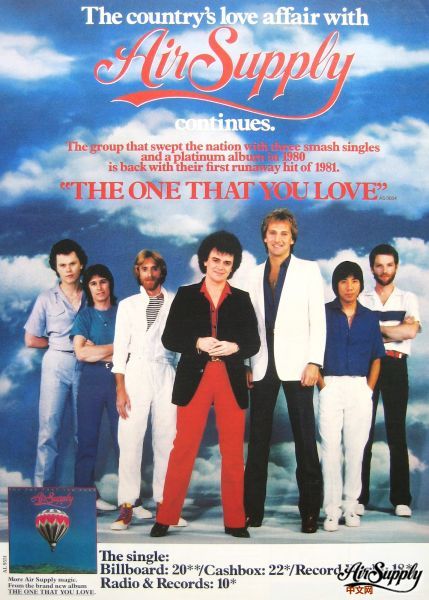
The new album’s lead single, ‘The One That You Love,’ was released in the U.S. in May. Most other counties had a June release. The commercial single was sold with a picture sleeve, and was the first glimpse at the new visual branding of Air Supply’s logo. The stylized lettering was designed by Ray Barber and became synonymous with the band. ‘The One That You Love’ climbed the charts, and on July 25, shortly after the release of the new album, it replaced ‘Betty Davis Eyes’ by Kim Carnes at the top of Billboard Hot 100 to become Air Supply’s first #1 hit.
Graham knew that ‘The One That You Love’ would be a hit when he wrote it, so he was not surprised when it took radio by storm. “I knew it was a strong song and couldn’t wait for Russell to hear it. There’s an unusual C-A-F progression in ‘The One That You Love’ that I discovered completely by accident. By no means am I a good musician, so I’m always finding new chords which sound nice and melodic. If I knew what I was playing, I might say to myself, ‘theory-wise, this is impossible.’” Graham remembers watching Clive Davis behind the recording console when Davis first heard the song. “We thought, ‘Oh God, does he like it or not?’ He turned around to Russell and I and said, ‘It’s going to win you a Grammy, and it’s going to be a #1.’”
“The vocal for ‘The One That You Love’ was recorded in one take,” said Russell. “I remember getting into the zone and everything else just disappeared. There is just you and the song. It’s still a dream being part of a band that has the #1 record and platinum albums, and it’s hard to latch onto. I have to pinch myself sometimes.” Manager Lance Reynolds was ecstatic when he heard that ‘The One That You Love’ was #1. “I can’t believe it,” he said. “That means in twelve months, we’ve had a number three, a number two, and two number ones (‘Lost In Love’ was #1 on Billboard AC Chart).” ‘The One That You Love’ remained on Billboard for 19 weeks, making it clear that Air Supply was going to be around for some time.
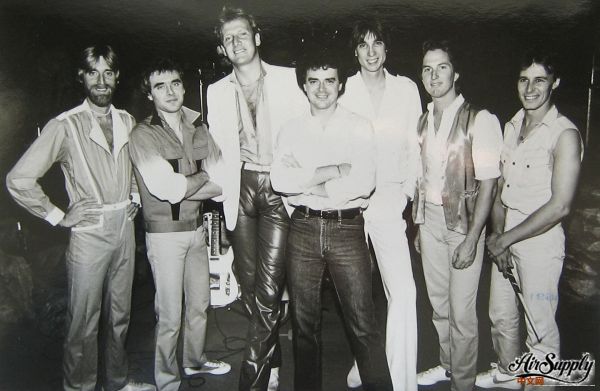
‘The One That You Love’ single was released in Australia, and peaked at #10 on June 22. Yet many local radio stations refused to play the song, saying it was “just not good enough.” So here was the number one single in North America, being played on 124 radio stations, and it could barely make a headline in Australia. Many of the Aussie radio stations who were caught with their pants down when ‘Every Woman In The World’ went to the top of the charts in America, made the same mistake with the new single.
Co-manager Fred Bestall believed that Air Supply was not popular at home mostly because they were not considered a fashionable band. “What can I say?,” he said. “It’s extremely disappointing and it hurts the band a great deal knowing that there’s so little interest in them from the country they started in. There’s no possible reason for it. At first we thought it was because Air Supply isn’t considered mainstream and they’re not trendy. But can the rest of the world be wrong? The most disappointing part of it is that the guys in the band are so supportive of the Australian music industry. And they’re kicked in the teeth for their efforts. The problem seems worst with the industry, more so than the public. The public is coming around now. I mean, the ‘Lost In Love’ album is platinum in Australia, our first platinum album. But speak to anyone in the industry and they’ll laugh. And the fact that the album is platinum doesn’t seem to suggest to the radio programmers on the major stations that they should be playing it. It’s a strange thing in the Australian market. ‘All Out Of Love’ just barely got into the top 10, ‘Every Woman In The World’ went to 8, and ‘The One That You Love’ went to number 10. Now, they’re worse off than they were, because ‘Lost In Love’ (Original Version) was a huge song there.”
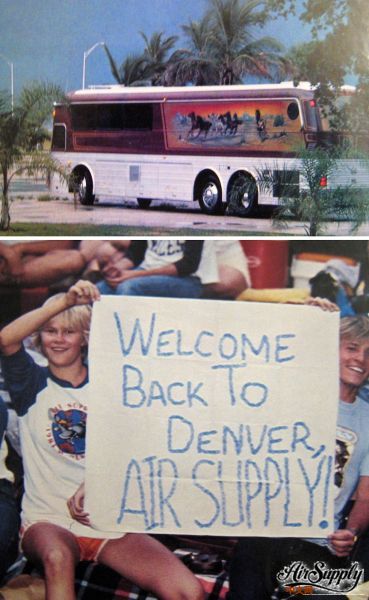
Air Supply began a six week tour of the U.S. in April, playing mostly State Fairs and large concert halls. In May, they did promotional work in Europe, including a performance in London on the popular television show Top Of The Pops. They stopped in Amsterdam for a television special in which they stared with Paul Simon, Dionne Warwick, James Taylor and Gino Vannelli. This was followed by a short visit to Japan in June, before returning to North America in July for a lengthy tour of the U.S. and Canada.
When they arrived in Canada, the band collected 42 gold and silver records. They were forced to parcel them up and ship them home because they were too heavy to carry around on tour. Air Supply’s popularity in Canada was sky-high. After a performance in Hamilton, Ontario, there was total chaos backstage when 1,000 screaming kids blocked the band from leaving their dressing rooms. The police had to be called in to help calm the manic crowd. The final leg of the North American tour finished in late September after having been extended a full month due to popular demand. Air Supply’s 24-man entourage travelled 32,000 miles on their North American tour, in buses fitted out with beds, TVs, hi-fi equipment and microwave ovens.
In August, Air Supply played two shows at the prestigious Greek Theatre in Los Angeles. This performance was a highlight for Russell because his wife Di was in attendance, a rare exception to Air Supply’s general policy to exclude wives and girlfriends on tour. Di had no idea how big Air Supply had become in America, and was shocked to see so many fans lining up in Denver to get tickets at 7am. “I was in Los Angeles for their two concerts at the Greek Theatre where Neil Diamond did Hot August Night, and they really were hot August nights,” recalls Di. “They were sold out weeks before and it was fantastic - just incredible. Russell and I sneaked away for two days on our own, and at Disneyland there was a guy who left his place in the long queue for the Matterhorn, and waited for half an hour until we got off just to have his picture taken with Russell.”
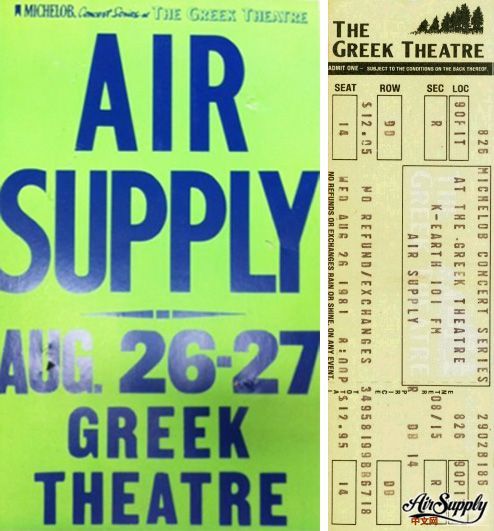
Air Supply’s performance at the Greek Theatre was memorable for Donnie Sutherland, host of the popular Australian television show Sounds. Sutherland and his three-man crew flew to America to film in-depth scenes featuring Air Supply and the group’s lavish and sometimes boisterous lifestyle in the U.S. The footage was to be used in a documentary about Australian music in the United States called Oz Rock Abroad, which focused on Air Supply, Rick Springfield and Little River Band. “It was a knockout,” said Sutherland. “The Greek is a magnificent outdoor venue on the side of a hill in Griffith Park, just out of L.A. Outside the theatre a huge billboard displays posters of past and future acts there. It warmed my heart to see our own Australian band [Air Supply] among them with a big red sold-out sign across the poster. We were with them most of the days. Whatever they did, we did - well most anyway. We rode around in their limousines and went to their parties. We got some spectacular sequences.”
Donnie Sutherland planned to film Air Supply’s concert at the Greek, so with the help of some of the Air Supply members, they managed to set up the sound and visual equipment inside the open air amphitheatre. “We recorded the first two numbers Air Supply did,” he explained, “and everything was going great. Then someone suddenly ripped out our leads. And a couple of very heavy looking guys told us to get out - or else. They weren’t mucking around so we beat it fast dragging the equipment with us. We later found out that these people have an ‘agreement’ with some of the local entertainment places. And they put a pretty high fee on the recording of their concerts. I innocently asked how much and was told $150,000. We were dead lucky to get the footage we did. The night was a big success for the group, and after the concert everyone celebrated into the small hours at a Beverley Hills hotel.” The documentary, Oz Rock Abroad, aired in Australia on January 5, 1982.
The failed attempt to videotape the concert at the Greek Theatre proved to be a costly mistake for Air Supply’s managers. The American Federation of Musicians filed a legal suit against Bestall & Reynolds, claiming that the defendants notified the union that they would be filming the Air Supply performance. Bestall & Reynolds then cancelled the video session, but failed to notify the union 96 hours in advance of the concert shooting, as provided for in the union regulations. The union claimed that Bestall & Reynolds owed them and some of its members $17,421.
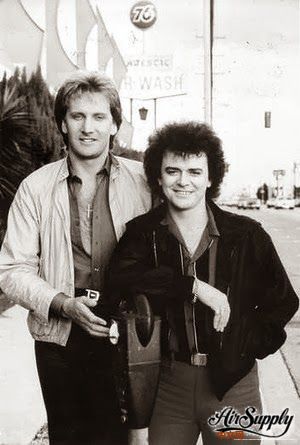
It had become a band tradition that on the last show of each tour, the band and crew members played practical jokes on each other. Unfortunately, the final show of the 1981 summer tour was rained out, so all schemes and jokes had to be postponed until next year. “Last year,” said drummer Ralph Cooper, “the lights went up for the show and I started to play my drums, and all of a sudden I’m enveloped in white clouds. Someone had put a thin layer of baby powder on each of my drums. As I hit them, powder flew up and into my face!”
It was a long and grueling tour, but management knew it was important to get the band back in front of the public as soon as possible. Many fans still did not have a good grasp of who Air Supply really was. The band’s promotional videos were never played on MTV. “They put out a record and people would marvel at the music and love the songs,” said Air Supply representative Tom Ross of ICM concert agency, “but they never connected until they saw them on stage. In the 60s, you had album covers and it was the only way to know what the band looked like. Was the bass player really blonde, or is that girl from the band Heart really hot? You studied that album cover, and the sleeve had the lyrics. That was your introduction, and then you had to go see the band play live to see if they could do this, or was it some studio record where they used a lot of sounds and overdubs, but they couldn’t reproduce it live. So you had to go to the show to find out who were the real entertainers that could pull it off. People always want to see an act live because it adds a whole other dimension.”
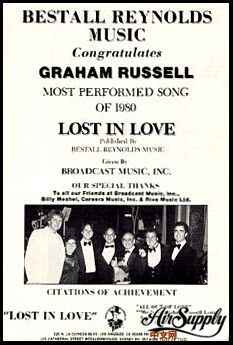
Despite having four songs reach Top 5 on Billboard, many North Americans thought the lead singer of Air Supply was female. Russell remembers when a prominent Hollywood record producer was shocked to discover that he was a man. The producer had just heard Air Supply for the first time and he ordered his assistant to “get me a date with that singer.” Graham found it rather comical when they duo showed up at the studio for an interview and the confused producer discovered the truth.
In June, Air Supply was presented with two significant awards. BMI (Broadcast Music, Inc.) held their annual awards ceremony in which artists (writers and publishers) are recognized for their achievements for the year. Graham flew to the U.S. a few days ahead of the rest of the band to attend the event at the Beverley Wilshire Hotel in Los Angles with his managers Fred Bestall and Lance Reynolds. The most important award of the evening, Most Performed Song of 1980, was presented to Graham for his song ‘Lost In Love.’ Graham, who was represented by BMI via that society’s reciprocal pact with Graham’s Australian performing rights organization, and publishers Bestall Reynolds Music, Careers Music and Riva Music Ltd. received special engraved glass plaques in recognition of the ‘Lost In Love’ achievement. By 1983, ‘Lost In Love’ had in excess of 1 million performances, a peak achieved by few songs. BMI vice president, Ron Anton, traveled to Australia that same year to present an award to the Australasian Recording Right Assn. for its role in the success of ‘Lost In Love.’
The 1980 Gift of Music awards, presented by NARM (National Association of Recorded Merchandise), was also held in June. Air Supply took home the award for Best Selling Album (‘Lost In Love’) in the new artist category.
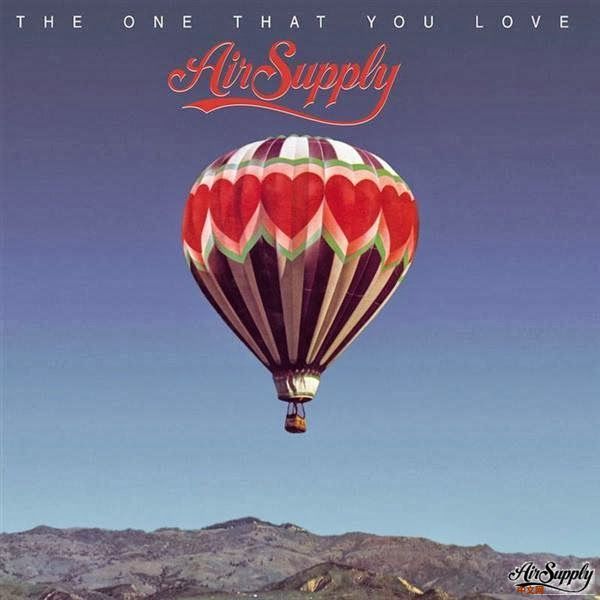
Air Supply’s success in America created interest in some of the bands early recordings. April Music, a publisher and affiliate of CBS Songs International, controlled Air Supply’s material from when they were signed to CBS. April Music and CBS were both quick to grasp the moment and capitalize on Air Supply’s recent success. According to April Music executives, there was significant interest in ‘Love and Other Bruises,’ ‘Empty Pages’ and ‘Ready For You.’ In Japan, April’s counterpart released cover versions of the last two by artist Mr. Go. In America, Barry Manilow expressed interest in recording ‘Empty Pages.’
The new album, ‘The One That You Love,’ was released in July. It quickly achieved platinum status in Canada and the U.S.. In Australia, it was released a month later, and was gold certified after just a few weeks. The public embraced the new record, but it was panned by music critics. Air Supply was simply not the sort of band that music critics found appealing:
So single-minded are these songs that they all tend to sound alike. While the tunes are pleasant on the surface, there is hardly any variety in either the music or the words, little evidence of true feeling in the vocals, and no insight. The songs sacrifice uniqueness for familiarity. - Ron Weiskind, Pittsburgh Post-Gazette
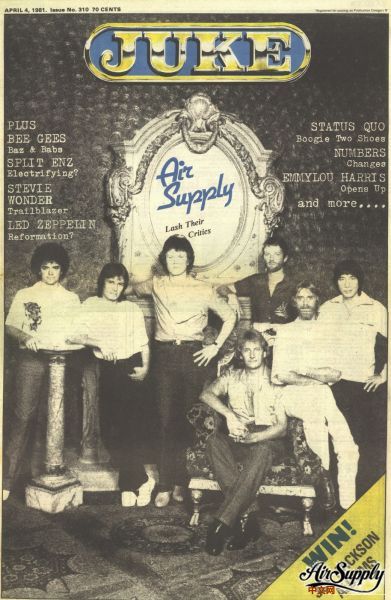
Air Supply Lash Their Critics - April 1981
“Every time we release a single, or get together to do an album, you can only do your best,” said Russell. “Then it’s up to the people. If they like it, fantastic. If they don’t, then you have to really start to worry. You can never take it for granted. So I guess putting up with any sort of criticism is part of the deal. Most of the critics that can us just don’t like this sort of music. The hard rock press think we’re strange. They actually think we’re gay. I’ve never considered myself effeminate in the slightest. We’re just sensitive. I suppose they’re trying to criticize the music because we’re so successful, or perhaps because they can’t score women. [But] they are being dishonest to themselves by reviewing our music, because they are not doing the job they are paid to do. They are not giving an honest, unbiased opinion about the stuff as they don’t like love songs. I’ve had some disgusting things said about my voice - saying I’m nasally, or that I brayed like a donkey, which is just crap. Their opinion, most of the time, is of no consequence to me whatsoever. As long as it’s intelligently done, then fine. But I can honestly say that out of maybe the last ten or twelve reviews, one or two of them have made any sense to me as they related to the music.”
When AC/DC said that Air Supply was not a big band, but simply a radio band, Graham was quick to defend his success; “I can understand someone like Agnus or anybody else saying something like that. For starters, I think AC/DC are one of the best bands in the world. They’re one of my favourites. I understand how he must feel. He’s been slogging on the road for so many years. There must be a form of resentment when you slog it all over the world for five or six years for peanuts, and then suddenly they’re huge. And they really are huge in America. Monstrous. But he just doesn’t know. We’ve sold millions of albums and singles in America and Canada. So we’re more than just a radio band. And to say that we don’t pull crowds is a ridiculous statement. Last October we did our first headline tour of America, and we sold out 36 of 40 shows. In the summer tour of America this June, we’ll be performing in 15,000 seat stadiums.”
Not all reviews for ‘The One That You Love’ album and Air Supply’s live show were negative. Many critics were amazed how the live show sounded just like the records. Air Supply invested much time and money into the 1981 tour to ensure they could reproduce the recorded sound in concert. ‘The One That You Love’ featured heavy orchestration, and critics praised Frank Esler-Smith’s ability to duplicate the sound live. “It’s hard for a seven-piece band to reproduce the sound when you’ve got a 40-piece orchestra on the record,” says Graham, “but we do everything we can to recreate that sound. We rehearse a lot. We don’t do anything fancy or pretentious - no smoke bombs or anything like that. We rely on musical ability and our vocals, rather than gimmicks, and put everything into every note. You never know what little part of a song people really like, and if it’s not there then you’re not being fair.”
“The reaction to the band over here [in North America] is just phenomenal,” said Fred Bestall. “We’ve had no negativeness from any sections of the American music industry. Everything is amazing. There was, of coarse, talk that Air Supply were a singles band and that the success of the first album here, ‘Lost In Love’ was mainly due to the fact that it had the three singles on it. However, the new album is out now and it’s Top 20. The second album has delivered the goods and proven that Air Supply can do it - and keep on doing it. Luckily, we haven’t just been slotted into that AOR category. We’re getting all sorts of air play, and the rock stations are programming the song too.”
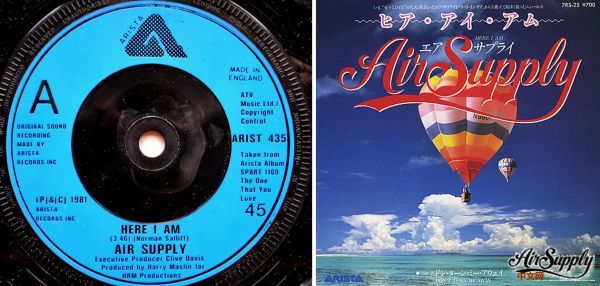
'Here I Am' - U.K 'Here I Am'- Japan
Arista released the second single, ‘Here I Am,’ on September 12. The title of the song often included, ‘Just When I Thought I Was Over You,’ so as to avoid confusion with the previous hit ‘The One That You Love,’ as both songs shared a lyric. American singer/songwriter Norman Saleet, who wrote the music and lyrics for ‘Here I Am,’ had recorded a demo of the song for RCA Records in 1980. He later included it on his first and only album titled ‘Here I Am’ in 1982. When Saleet sent the song to Clive Davis at Arista in 1980, it was with the intention that Barry Manilow would record it. “Two days later [Arista] put a freeze on the song,” said Saleet. “Then I didn’t hear anything for a month. Then they called and said they wanted it for Air Supply, not Manilow.”
‘Here I Am’ was an instant hit for Air Supply, and was played on radio non-stop. It showcased Russell’s powerful voice, and it was clear that he was the main voice of Air Supply going forward. On November 21, ‘Here I Am’ reached #5 on Billboard, making it the fifth straight Air Supply single to chart in the Top 5. It did not perform nearly as well in Australia, where it reached #43 on November 2.
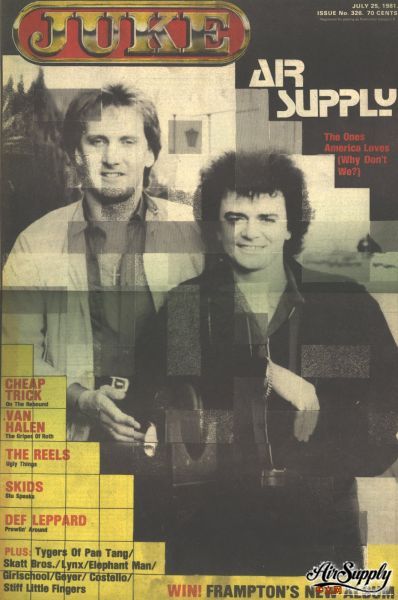
Juke Magazine (Australia) - July 25, 1981
When ‘Here I Am’ became Air Supply’s fifth straight single to crack the Billboard Top 5, it broke Arista’s previous record set by Barry Manilow. Manilow had four straight Top 5 hits starting with ‘Mandy’ in 1975, and ending with ‘Can’t Smile Without You’ in 1978. Air Supply’s accomplishment is impressive when you consider that in Arista’s history, they had just 13 Top 5 hits. Talented Arista musicians like Dionne Warwick, the Bay City Rollers and Eric Carmen each had just one Top 5 hit by 1981.
“Our offices hummed with excitement,” said Clive Davis. “Everything was happening at such an accelerated, exhilarating pace. At every one of my weekly staff luncheons, there was more news to report, more new music to share, more reports on sales and airplay. In those days before SoundScan and sophisticated means of measuring radio play, Arista’s sales and promotion teams had to gather up information on the telephone, and get reports from retail and radio. They would come into the conference room with stacks and stacks of data, waiting for me to grill them on how each of our records was performing. Every detail mattered. Every market where a record was performing well, or slipping, every sign of progress or a problem was pored over and analyzed.”
By late summer, you couldn’t turn on the radio anywhere in North America without hearing Air Supply. The band was on top of the music world, and were living the lifestyle of rock royalty. “Twelve months ago nobody knew us,” said Graham. “Now we need 30 security guards at the stage door. I went out and bought myself a house. It wasn’t an expensive house. I paid $64,000 for it. I walked into the bank and I payed cash for it. I put a cheque for $64,000 on the counter. I think the bank manager was quite surprised because he was expecting me to apply for a loan, but I just payed for everything straight away. It was an older house on the beach in Sydney, and the location was beautiful. On one side was the beach, and the other side was a river. I had a canoe and could go out and fish for prongs and shrimp.”
Di Hitchcock remembers being starstruck on her recent trip to America. “Air Supply’s tour manager was staying in the suite at the Beverly Wiltshire where Warren Beatty lived for years,” she said, “and I went around taking pictures of everything - including the loo. Then at a very smart party for the guys at the Beverly Hills Hotel, who should be there but [Australian performer] Toni Lamond. You couldn’t tear me away from her.”
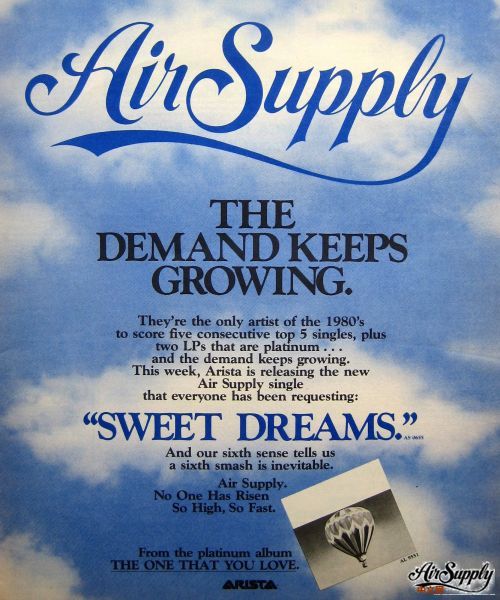
Fred Bestall and Lance Reynolds opened an office in America, with plans to build a recording facility. Operating as Bestall Reynolds Inc., they entered into negotiations to release a movie called Sherwood, with Graham writing the score. The film had the backing of Paramount and was expected to debut in the summer of 1983. A double album soundtrack was expected to accompany the film on which Air Supply would play, along with other notable musicians. In the last twelve months, Big Time and the publishing arm of the operation, Bestall Reynolds Music, had signed four writer-permformers, including Patricia Berrell and New Zealander Jon Stevens. “We have just signed a Canadian band, Doug and the Slugs, to our publishing company,” said Bestall. “They have had great success in Canada and are getting their material released in the U.S. right now.”
Despite the fame, accolades and prospects of a bright future, Air Supply believed their compensation was not where it should be. In their opinion, the record contract with Big Time was problematic. Naturally, Reynolds and Bestall were behind Air Supply 100%, and tried to give them an image in North America that appeared different from what their music portrayed. “To give them an image, we toured them here three times in twelve months,” said Bestall. “We played colleges as well as auditoriums and fairs. We toured them so much purposely to give them an image other than a band that sings nice ballads. Everybody thinks they’re going to come out like the Oak Ridge Boys, all dressed in suits, not playing instruments and doing a bit of dancing. They all play and dress like a normal rock band, jeans and casual cloths. They’re not a production unit as such, which a lot of people still expect.”
Bestall, Reynolds and Billy Gaff pushed Air Supply into new areas of entertainment, including a project for the movie industry. It involved Air Supply and Jon Cougar performing music for a movie based on Rod Stewart’s, ‘The Killing of Georgie,’ with Stewart acting and singing in the film. A movie soundtrack was to be recorded. Unfortunately, the entire project collapsed when the company backing the movie (Meta Film Associates) learned that Stewart’s recording contract with WEA would not allow them to distribute the film. Meta Film Associates were already $125,000 into the project, and in December they sued Stewart and Gaff, claiming they should have known that the contract with WEA made the project impossible from the start.
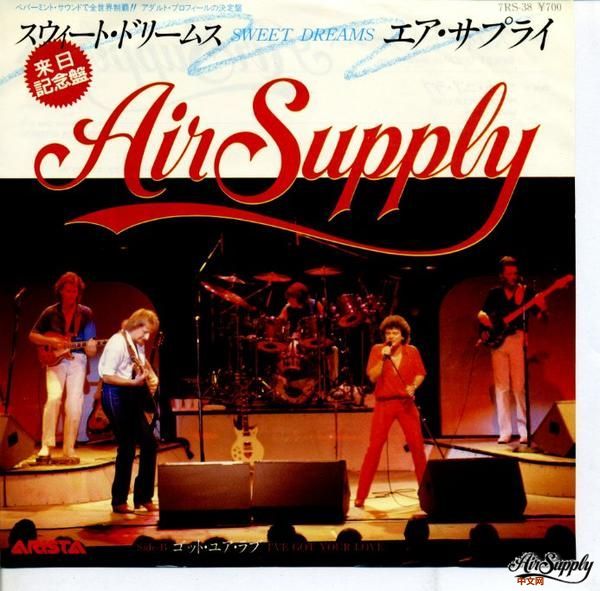
'Sweet Dreams' 7" Single - Japan
Before the third single was released, there was much debate over which song to select. ‘The One That You Love’ was filled with radio friendly songs, so the next single was not an obvious choice. Graham lobbied for ‘Sweet Dreams’ because it was more upbeat than all the previous singles. Clive Davis agreed and released ‘Sweet Dreams’ worldwide on December 1. It quickly climbed the U.S. and Canadian charts, and became Air Supply’s sixth straight single to reach the Billboard Top 5. It did not chart in Australia or the U.K, but was considered by many music critics to be Air Supply’s most creative work to date.
Air Supply shoots for their sixth consecutive top five single with this swirling, melodic love song. The fluid vocal, lush orchestration and sentimental lyric make this one of the group’s strongest records yet. - Billboard
It’s the best thing they’ve done in a while, more in the direction of REO Speedwagon than Mr Manilow. Hip stuff. - John Shomby, WEZB-FM Program Director
By the end of 1981, it was obvious that cracking the U.K. market was a difficult task for Air Supply. The last single to chart there was ‘All Out Of Love.’ Graham admitted that perhaps the band would need to, “bash a bit harder at the door,” to improve their status in the U.K. and Europe. If Air Supply believed they could crack the U.K. market, they were not alone. Australian bands were no longer being ignored in America and Europe. Rather, they were sorted out and nurtured in case they miraculously turned out to be the next Little River Band or AC/DC. “Groups like Little River Band, Cold Chisel and Air Supply have pushed awareness overseas to such an extent that it’s incredible,” said Stewart Silver of The Australian Record Industry Association. Countdown’s Molly Meldrum believed that “according to people both in America and in the U.K., Australia of the eighties will be the Liverpool of the sixties.”
Competition for radio play in the U.K. was fierce in the early 80s. Bands like Duran Duran, Culture Club, Billy Idol, Wham!, the Pretenders, Adam Ant, the Police, and Spandau Ballet dominated the airwaves. Band image was critical in the early 80s new romantic movement, and Air Supply was not well positioned in this area. The British invasion took a year or two longer to hit American shores and this eventually affected the success of Air Supply on their adopted home front. Until then, they had lots of records to sell, and did so in select markets around the world.

‘I'll Never Get Enough Of You’
Air Supply still got very little attention from Australian fans when they returned home from touring in the U.S. On their most recent return to Sydney, the band did not spark off any of the near-riot scenes among their fans that marked their U.S. concerts. They simply sat in the airport VIP lounge with their wives and girlfriends, and their young toddlers scrambled over the carpet. There were no hoards of fans outside, or security personnel as they drove off in four-door sedans. “We are not heavily known [in Australia],” said Graham. “I think this is an advantage because we can walk down the street without being asked for autographs.” Air Supply preferred this family image and life without the superstar hype and hassles, but this lack of recognition in Australia did worry them. Whatever success Air Supply experienced in Australia came after their numerous hits displaced records set in the U.S. by the Beatles, thus forcing Australian radio to belatedly play Air Supply. Australia was a much smaller market compared to the States, Japan, West Germany, Britain and France, but it had the second highest per capita record sales in the world, behind Sweden. The Australian market was still important.
Nippon Phonogram released the single, ‘I’ll Never Get Enough of You,’ and it became a huge hit in Japan. The song was used as the opening theme on a popular Japanese TV show, which greatly increased its popularity. Air Supply needed to add the song into its set-list when touring in Japan, because it was not included in the live show elsewhere.
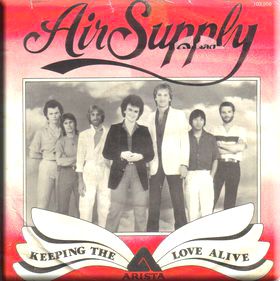
German Pressing - 7" Single
Ariola Records, a sub-label of Bertelsmann AG, released the single, ‘Keeping The Love Alive,’ throughout much of Europe. It received airplay in these countries, but became most popular in South East Asia. “This was never a single in the U.S., but overseas it was very big,” recalls Graham. “I remember when we were in the Philippines and they asked if we would be playing ‘Keeping The Love Alive.’ I told them that we had not even rehearsed it because we had not been playing it live. They said it was like their national anthem, and over most of Asia, so we pulled it together and did it that night.”
On December 1, the National Soft Drink Association held its annual convention in L.A. The event was important for the top soft drink brands because independent bottlers and suppliers want to hear that they are being backed by marketing dollars. Brands like Coca-Cola, Pepsico and Dr. Pepper use the event to unveil their new promotion and marketing campaigns. Dr. Pepper announced they were canceling the long running ‘Pied Pepper’ theme and switching to a new campaign featuring Scott Baio of Happy Days fame. They also announced that future radio commercials would feature rock band Air Supply and country stars Alabama. Dr. Pepper had a long history of dance and music in its advertising, and this continued with the new theme, ‘All you gotta do is taste.’ Air Supply recorded a jingle for Dr. Pepper:
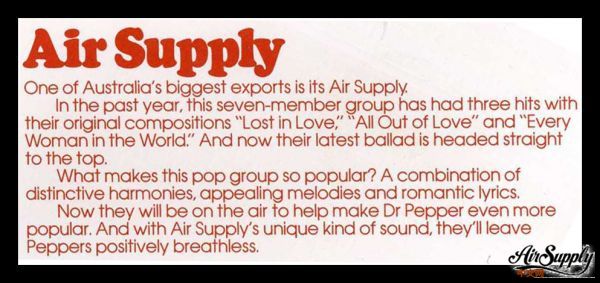
Promotional Ad Sent to Radio (Summer 1981)
Graham - “To be a pepper, original like a pepper, all you gotta do is taste.”
Russell - “To know the pleasure of a flavour you will treasure, all you gotta do is taste.”
Both - “Be a pepper. The flavour’s got a feeling, original and appealing, and all you gotta do is taste.”
Russell - “To be a pepper, open up a Dr. Pepper and all you gotta do is taste. To be a pepper, open up a Dr. Pepper and all you gotta do is taste. Be a pepper, drink Dr. Pepper”...fade...
Dr. Pepper sales had dropped leading up to convention so the company faced significant pressure to turn things around in the new year. The decision to include Air Supply at such a critical time gave an indication of the marketability of the band in 1981.
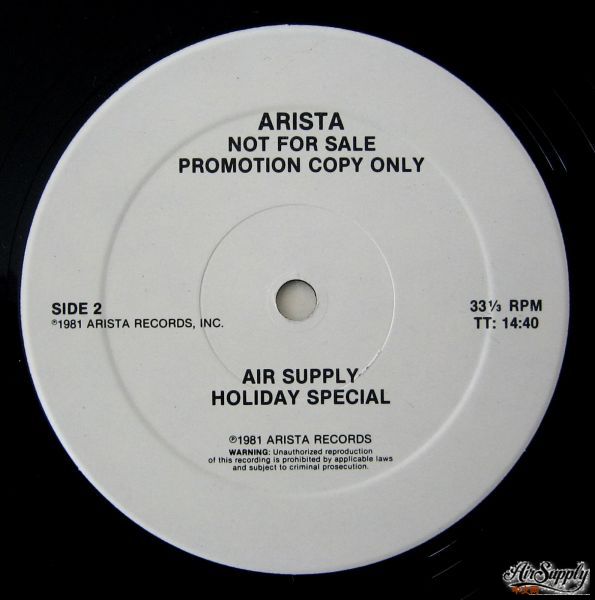
In early December, Arista produced an hour-long radio syndication of an Air Supply live performance. Radio syndication of music specials had grown rapidly in the early 80s, and most record labels were content to let professional syndicators handle these programs, but Air Supply’s Holiday Special was Arista’s first label-produced syndication. The 9-song Air Supply Holiday Special was not the result of deliberate planning. The band had taped a live concert during the 1981 summer tour in order to compensate a particular radio station after rain forced the cancellation of another concert which the station was set to broadcast live. When Arista’s director of product management, Abbey Konowitch, heard the tape, he thought it was good enough to make into a syndication radio special. Harry Maslin remixed the tape, and in LP form, mailed it out to about 100 Top 40 and A/C stations. Radio stations received the syndication free of charge, although Arista reserved half of the commercial spots for its own ads. Arista had greater control over which radio stations received the syndication because it was label-produced. “It wasn’t incredibly expensive to have the recording mixed and pressed onto discs,” said Konowitch, “but it was very time-consuming.” |
|